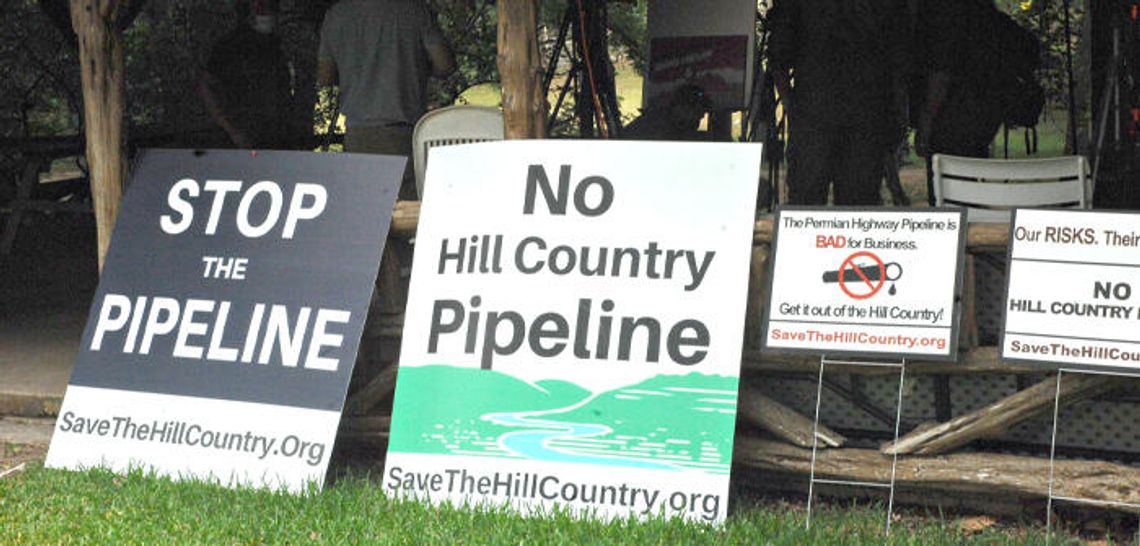Signs outside a Monday press conference in Wimberley (above) can be seen all along the route of the Permian Highway Pipeline (PHP).
The laughter of children playing in and along Cypress Creek provided a backdrop as a new federal lawsuit against Kinder Morgan’s Permian Highway Pipeline (PHP) was announced in Wimberley on Monday.
The setting was by design, explained by Jeff Mundy, attorney for the litigants. “This lawsuit is about water.”
The Wimberley Valley Watershed Association (WVWA) and Trinity Edwards Springs Protection Association (TESPA) filed the suit for violations of the federal Safe Drinking Water Act, asking for the company to clean up as best it can a March 28 spill that fouled a number of drinking water wells and to agree to never again use a drilling mud substance that contains known human carcinogens.
Dr. Teri Albright, whose well near Chimney Rock Road in Blanco County was fouled as Kinder Morgan began a bore for the first of two crossings under the Blanco River, said that on the Sunday it occurred, she and her husband, both physicians, first thought it was a problem with their well pump.
“We did not know what was happening. It had never happened before” in the years their well had been in service.
A well company found otherwise and, two days later, Albright learned her neighbor had experienced the same thing. Water that used to come out of the tap pure, clean and “delicious” was now muddy.
Kinder Morgan halted work at the site but in the 175 days since, the lawsuit alleges, has done nothing to clear up the contamination, Mundy said. David Baker of the WVWA said he doesn’t even know if that is possible, as the 36,000 gallons the company admitted it “lost” when its bore hit a karst feature during that initial pilot bore has travelled through the aquifer.
He noted that tests of samples confirmed the existence of heavy and light metals. The chemical in the drilling mud the company has called inert contains, according to its manufacturer human carcinogens.
There’s no safe level for exposure to human carcinogens,” he said. “None.”
After the breach, Albright and her husband both continued to work under rules of the coronavirus including washing their clothes every day, but were unable to do. Nor could they even bathe, she said. Samples of the water from her tap were on a table and, while speaking, Albright lifted one up to the light. “I don’t know what’s in it and it doesn’t matter. I would not put this in my dog’s bowl,” she said.
They now have a temporary water tank on the property that costs “well over $1,000 a month” to keep full. They had to replace the water heater, filtration systems, etc., that were “clogged with thick, brown mud.”
“This is the only source of water on our property,” she said. “For Kinder Morgan to be negligent enough to pump into a karst feature and to continue to pump and not tell us – they have violated our home, our lifestyle and the value of our property.” Though they planned to stay in their “retirement home” along the Blanco, she said if they ever do decide to sell they will have to disclose that the water has been fouled. “It’s like they came on our property and set a match to our house.”
Mundy characterized the legal action as a citizen suit, where people step into the government’s role as enforcer. There’s a $57,000 a day fine for violating the law and Mundy made it clear that money goes into the U.S. Treasury, not to any of the individuals or communities that have been harmed.
“It’s pretty simple,” he said of the law. “It prohibits the injection of contaminants into underground sources of drinking water.” Before the breach, he said the water that came out of Albright’s well was “some of the highest quality water in this state, indeed the U.S., purer than the water that comes out of city of Austin tap water.” Now, he said, “it’s unfit for human consumption.”
Among the substances the Lower Colorado River Authority found in the sample was arsenic. “Drinking arsenic is not good for your health,” Mundy said. “Drinking arsenic is dangerous. Putting arsenic into our aquifer is a threat to this community’s water supply.”
More than 10,000 people from Blanco to Kyle depend on the aquifer for their drinking water.
Baker of the WVWA and Patrick Cox of TESPA said they had been fighting the 72-inch, 430-mile pipeline that would transport natural gas from West Texas oil fields to near Houston, where much of it will be exported, since first learning of the PHP almost two years ago.
From the beginning, they said their message to the industry giant has been consistent: The Hill Country is not a safe place to locate such a project.
“The company was repeatedly asked to reroute their pipeline away from the unique karst geological region of the Texas Hill Country,” said Jim Blackburn, TESPA president and environmental attorney. “Kinder Morgan ignored these pleas and then failed to competently construct this project – violating the trust our politicians and state agencies gave them and, in the process, violating common law and federal law. Kinder Morgan earned this lawsuit.”










